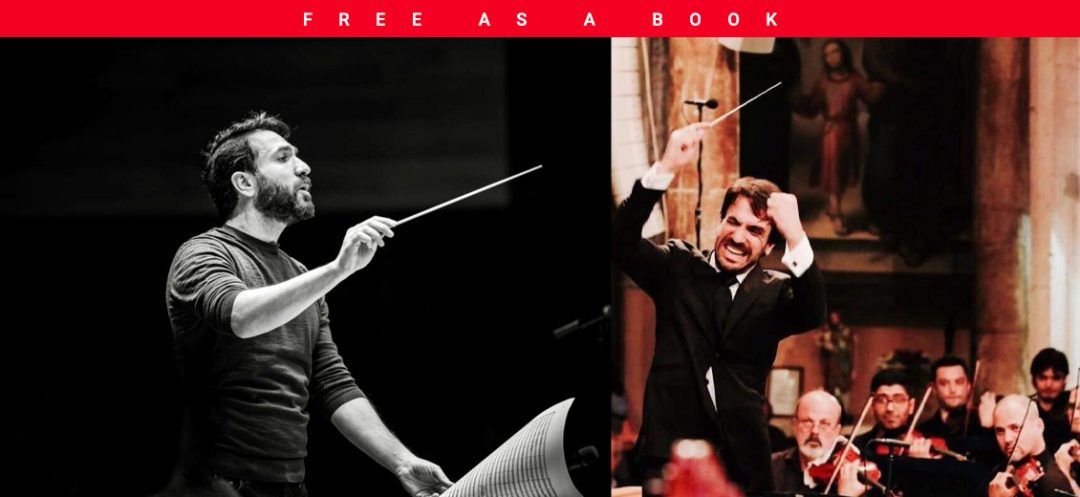
Lubnan Baalbaki, the permanent conductor of the Lebanese Philharmonic Orchestra, often associated with Western classical music, will ignite the Batroun Festival on July 26 at 8 PM during a “Lebanese Night.” This concert will revive the great hits of Lebanese songs from the 1950s to the 1980s and resurrect the masterpieces of great deceased masters. For the first time, Lubnan Baalbaki reveals to This Is Beirut the secret story of his beginnings.
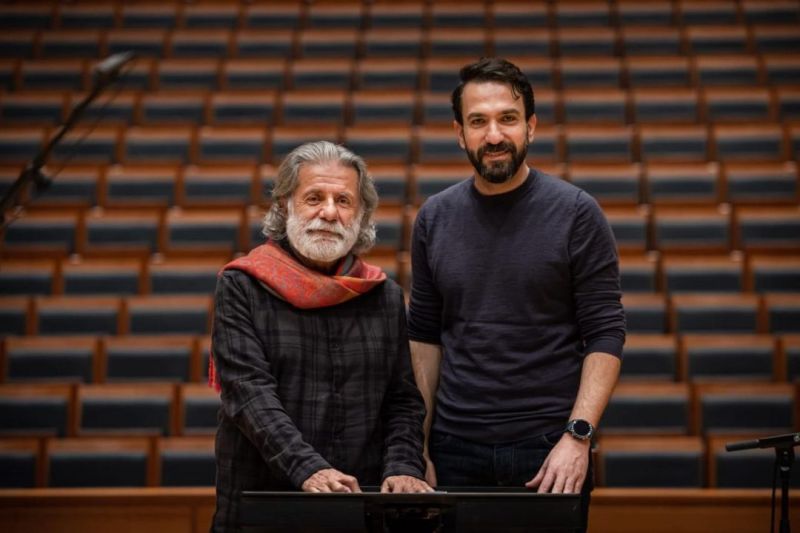 In North Macedonia with the great artist Marcel Khalifé in 2022.
In North Macedonia with the great artist Marcel Khalifé in 2022.
Born in the midst of the civil war in 1981, the third child of painter, sculptor and poet Abdel-Hamid Baalbaki was named Lubnan, to emphasize the family’s deep-rooted connection to Lebanon, when confessional and sectarian earthquakes were tearing the country apart. Lubnan grew up in a family of artists, with eight siblings dedicated to singing, music, painting and dramatic arts. Having discovered his passion for classical music, he travels to the world's music capitals, honing his knowledge under the guidance of his renowned teachers Petre Sbârcea, Horia Andreescu, Johannes Wildner and Kurt Masur. The great maestro obtained several prestigious degrees, including a master of arts in orchestral conducting from the University of Music and Performing Arts Vienna and a PhD in the psychology of orchestral conducting from the National University of Music in Bucharest. In 2013, he became the permanent conductor of the Lebanese Philharmonic Orchestra and, since 2015, the conductor and musical director of the diva Magida el Roumi. He has collaborated with the brightest names such as Soumaya Baalbaki, Marcel Khalifé, Abdel-Rahman el-Bacha, and Georges Khabbaz.
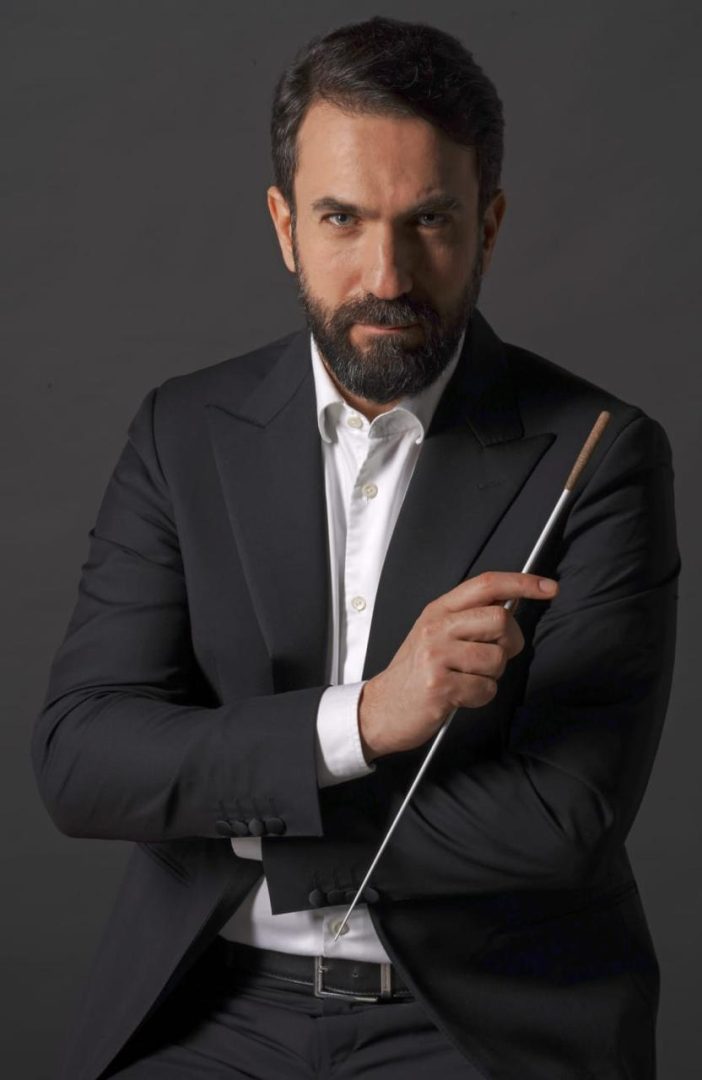 Photo by Waël Ladki
Photo by Waël Ladki
You have conducted the orchestra on prestigious international and national stages. How does the “Lebanese Night” concert in Batroun stand out from your previous performances? What unique touch do you wish to bring to it?
For the first time, I will be alone on stage with my orchestra composed of twenty-five musicians and the Choir of Notre-Dame de Louaizé. It is also the first time that the program is purely Lebanese from beginning to end. That is why the show is titled “Lebanese Night.” It is a journey through the history of Lebanese music, the classic songs of the 1950s and 1960s, and a tribute to the great figures of music and song, such as the Rahbani brothers, Feyrouz, Sabah, Zaki Nassif, Nasri Shamseddine. This journey continues, in a rather modern conception, with the repertoire of the 1970s and 1980s, which deserves to be celebrated and revalued with its leading figures, Ziad Rahbani, Salwa el Katrib, Melhem Barakat, Marcel Khalifé, Elie Choueiri, Marwan Mahfouz, Azar Habib, and many others…
[gallery size="full" link="none" ids="269083,269084"]
In the concerts of Magida Roumi and Soumaya Baalbaki, you conduct the orchestra. How would you describe your relationship with each of the two divas? What connects and distinguishes them?
I have been collaborating continuously with Magida el-Roumi since 2015, as conductor and musical director of her concerts. The voice of Soumaya, my sister, lulled my childhood and adolescence. She has the merit of having immersed me in the magic of music. Magida has a very unique style, which cannot be defined with words, a skillful blend of pop-classical music, while Soumaya sings tarab. A strong friendship ties me to Magida on a human level, and great complicity in terms of artistic affinities. The trust and freedom she gave me to create a new concept in terms of the orchestra’s structure and distribution have been very fruitful. The common denominators between the two divas are rigor and discipline. They are both meticulous in their choices, in terms of songs and concerts. They paid a high price for their conservatism, but they gained the public’s esteem and shaped their status as icons.
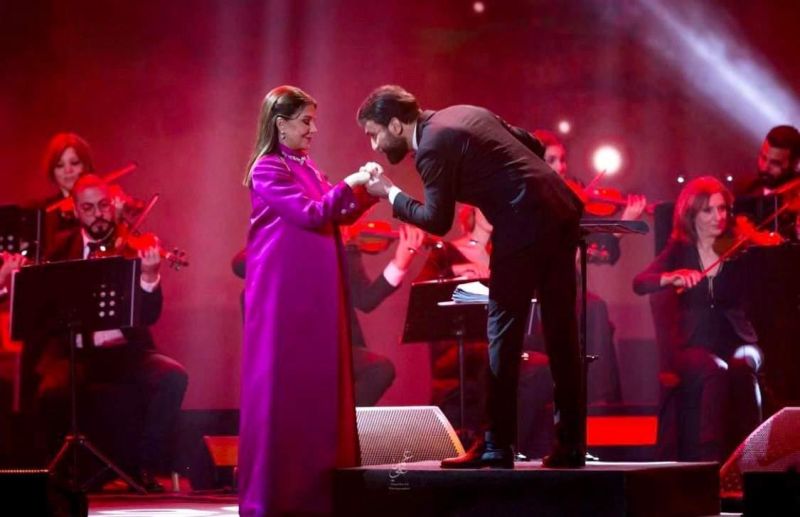 With Magida el Roumi at "Riyadh Season" in 2022.
With Magida el Roumi at "Riyadh Season" in 2022.
How did you discover your inclination for music? It seems there is a well-kept secret behind this spark in you?
There is a story behind my passion for music that I have never told. Everyone knows that the atmosphere at home predisposed me to art. But the real spark occurred far back in my childhood. There was a large pile of cassettes at home that accumulated day by day, before the advent of compact discs. One day, while rummaging through this ever-growing pile, I came across a classical music cassette that literally dazzled me with the orchestra and the sound of the violin. At home, tarab reigned supreme. Since that discovery, I would watch for the family’s absence and the quiet of the house to plug in the secret cassette, amplify the sound level, and let myself be intoxicated. The cassette played Beethoven’s Violin Concerto. It accompanied me from the age of six until I entered the Conservatory. It was this music by Beethoven that prompted me to travel to Vienna and specialize in classical music. It opened the doors to the world and humanity for me. It allowed me to better decipher the mysteries of life, creation and creativity. Music strengthened the bonds of the Lebanese people scattered across the seven continents and divided within the country. It reminded them of their umbilical relationship with the homeland. This is a tribute to the Lebanese composers who built the Lebanese musical heritage stone by stone, the perfect antonym to the battlefield and scorched earth to which Lebanon is often reduced.
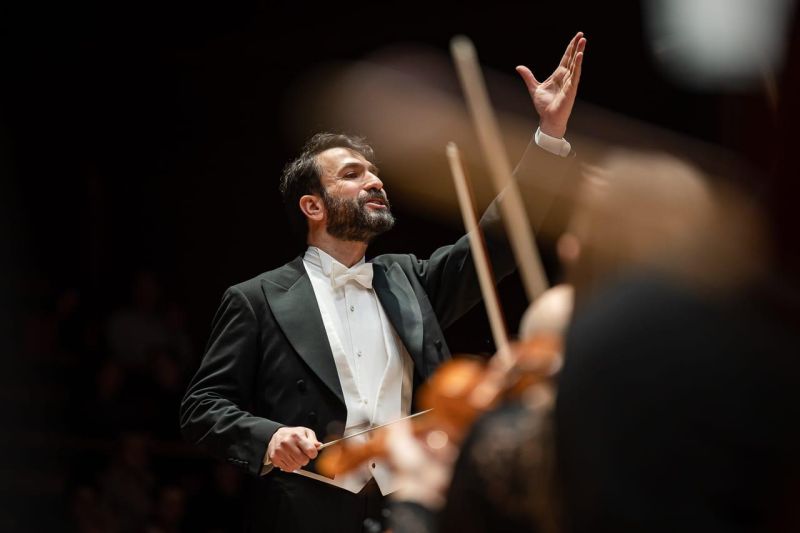 Photo by Waël Ladki
Photo by Waël Ladki
 In North Macedonia with the great artist Marcel Khalifé in 2022.
In North Macedonia with the great artist Marcel Khalifé in 2022.Born in the midst of the civil war in 1981, the third child of painter, sculptor and poet Abdel-Hamid Baalbaki was named Lubnan, to emphasize the family’s deep-rooted connection to Lebanon, when confessional and sectarian earthquakes were tearing the country apart. Lubnan grew up in a family of artists, with eight siblings dedicated to singing, music, painting and dramatic arts. Having discovered his passion for classical music, he travels to the world's music capitals, honing his knowledge under the guidance of his renowned teachers Petre Sbârcea, Horia Andreescu, Johannes Wildner and Kurt Masur. The great maestro obtained several prestigious degrees, including a master of arts in orchestral conducting from the University of Music and Performing Arts Vienna and a PhD in the psychology of orchestral conducting from the National University of Music in Bucharest. In 2013, he became the permanent conductor of the Lebanese Philharmonic Orchestra and, since 2015, the conductor and musical director of the diva Magida el Roumi. He has collaborated with the brightest names such as Soumaya Baalbaki, Marcel Khalifé, Abdel-Rahman el-Bacha, and Georges Khabbaz.
 Photo by Waël Ladki
Photo by Waël LadkiYou have conducted the orchestra on prestigious international and national stages. How does the “Lebanese Night” concert in Batroun stand out from your previous performances? What unique touch do you wish to bring to it?
For the first time, I will be alone on stage with my orchestra composed of twenty-five musicians and the Choir of Notre-Dame de Louaizé. It is also the first time that the program is purely Lebanese from beginning to end. That is why the show is titled “Lebanese Night.” It is a journey through the history of Lebanese music, the classic songs of the 1950s and 1960s, and a tribute to the great figures of music and song, such as the Rahbani brothers, Feyrouz, Sabah, Zaki Nassif, Nasri Shamseddine. This journey continues, in a rather modern conception, with the repertoire of the 1970s and 1980s, which deserves to be celebrated and revalued with its leading figures, Ziad Rahbani, Salwa el Katrib, Melhem Barakat, Marcel Khalifé, Elie Choueiri, Marwan Mahfouz, Azar Habib, and many others…
[gallery size="full" link="none" ids="269083,269084"]
In the concerts of Magida Roumi and Soumaya Baalbaki, you conduct the orchestra. How would you describe your relationship with each of the two divas? What connects and distinguishes them?
I have been collaborating continuously with Magida el-Roumi since 2015, as conductor and musical director of her concerts. The voice of Soumaya, my sister, lulled my childhood and adolescence. She has the merit of having immersed me in the magic of music. Magida has a very unique style, which cannot be defined with words, a skillful blend of pop-classical music, while Soumaya sings tarab. A strong friendship ties me to Magida on a human level, and great complicity in terms of artistic affinities. The trust and freedom she gave me to create a new concept in terms of the orchestra’s structure and distribution have been very fruitful. The common denominators between the two divas are rigor and discipline. They are both meticulous in their choices, in terms of songs and concerts. They paid a high price for their conservatism, but they gained the public’s esteem and shaped their status as icons.
 With Magida el Roumi at "Riyadh Season" in 2022.
With Magida el Roumi at "Riyadh Season" in 2022.How did you discover your inclination for music? It seems there is a well-kept secret behind this spark in you?
There is a story behind my passion for music that I have never told. Everyone knows that the atmosphere at home predisposed me to art. But the real spark occurred far back in my childhood. There was a large pile of cassettes at home that accumulated day by day, before the advent of compact discs. One day, while rummaging through this ever-growing pile, I came across a classical music cassette that literally dazzled me with the orchestra and the sound of the violin. At home, tarab reigned supreme. Since that discovery, I would watch for the family’s absence and the quiet of the house to plug in the secret cassette, amplify the sound level, and let myself be intoxicated. The cassette played Beethoven’s Violin Concerto. It accompanied me from the age of six until I entered the Conservatory. It was this music by Beethoven that prompted me to travel to Vienna and specialize in classical music. It opened the doors to the world and humanity for me. It allowed me to better decipher the mysteries of life, creation and creativity. Music strengthened the bonds of the Lebanese people scattered across the seven continents and divided within the country. It reminded them of their umbilical relationship with the homeland. This is a tribute to the Lebanese composers who built the Lebanese musical heritage stone by stone, the perfect antonym to the battlefield and scorched earth to which Lebanon is often reduced.
 Photo by Waël Ladki
Photo by Waël Ladki
Read more



Comments